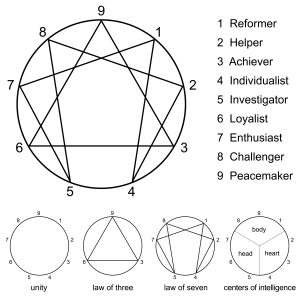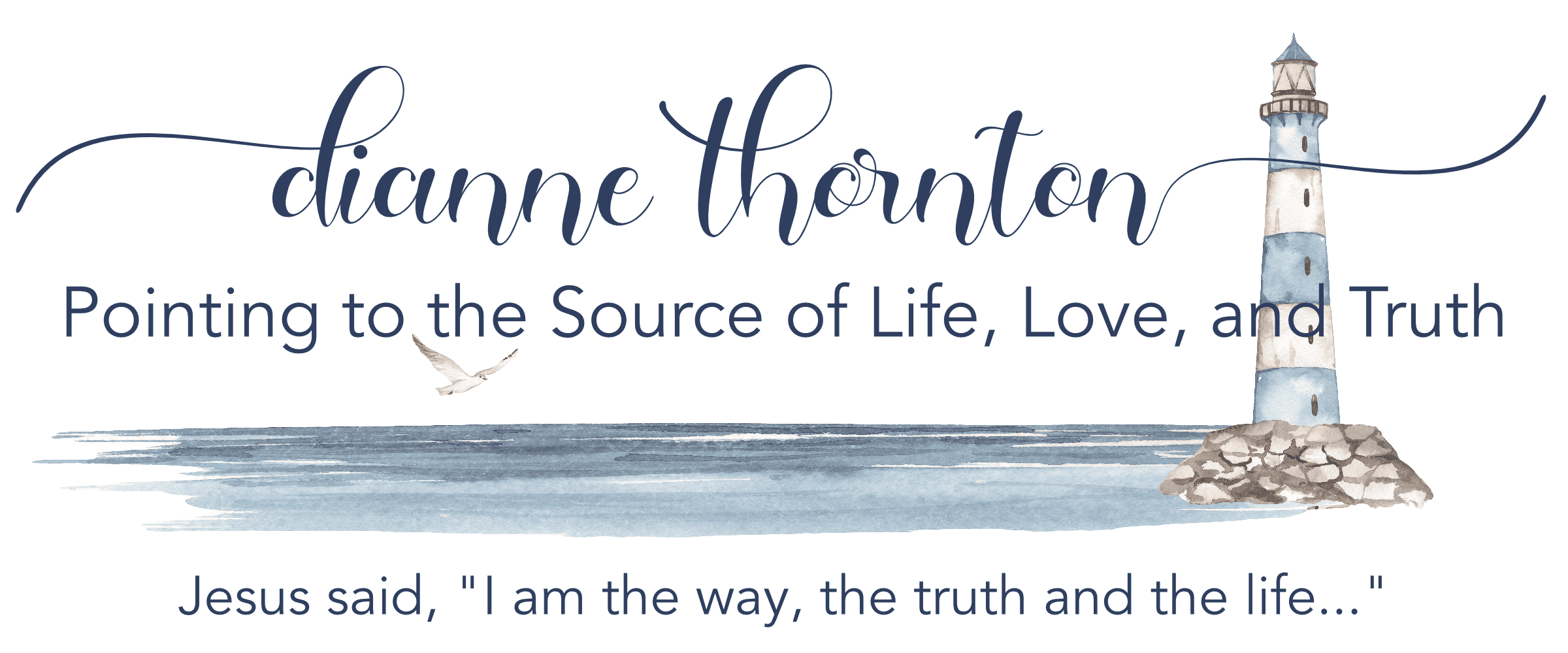9 Truths About the Enneagram and Personality Typing

Transformation. Change. We leave the old behind and embrace the new. The vast majority of social media posts with a #transformation hashtag are about lifestyle improvement. From weight loss to minimalism, people want to become a better version of themselves. Enter personality typing. It’s been around for a long time and quizzes abound. It appears the Enneagram and personality typing is the new kid on the block.
But the Enneagram personality typing system has been around longer than most people realize. My husband and I first encountered the Enneagram in the 90s. At the time, we were troubled by it. Our research indicated it didn’t hold much scientific value. But really, is any personality typing system backed by scientific research and evidence? Each has proponents and dissenters. The Enneagram is no exception.
The Enneagram Trend
As a blogger, I see trends that capture the attention of writers and social media influencers. The Enneagram personality typing system is one of these. While this post is not one I wanted to write, it is a God-given assignment. In some ways, I’m reluctant to press publish. As I know I will probably step on a few toes.
I know not everyone (maybe even most) won’t agree with me. But we are the body of Christ, right? The world knows we belong to Him by how we love each other—especially when we disagree (John 13:35).
But it’s because of love, I am compelled to write. My heart breaks when I see believers embrace questionable ideologies. My goal is not to judge, but to enlighten. To encourage you to reconsider your position on this particular personality typing system.
What to Do with the Enneagram
Social media is full of posts about the Enneagram. They start with, “What’s your Enneagram number?” Then everyone responds with theirs plus a wing. I get concerned when I read: “If you’re into Enneagram Voodoo …” or “I’m into the Voodoo.” Because somewhere in their spirit, these dear ones recognize that something isn’t quite right with the Enneagram. But rather than discover why, they embrace it.
Friends, that niggling doubt is there for a reason. It’s the Holy Spirit’s gentle nudge.

Discerning Christians should ask the following questions:
- What does the Enneagram look like?
- Is it distinctively Christian or Christ-like?
- Or does it look more like the enemy? A wolf in sheep’s clothing.
Let’s see what we can find.
My Current Research
With the resurgence of the Enneagram and personality typing, my previous reluctance resurfaced. As usual, I did some cursory research and found many books and articles on the topic. Precious few, however, encouraged caution regarding its use. Two were insightful.
- “Enneagram: The Road Back to You, Or to Somewhere Else?” by Kevin DeYoung (from The Gospel Coalition—TGC)[1]
- “Tell Me Who I Am, O Enneagram,” by Mitchell Pacwa, J.S. (from the Christian Research Institute—CRI)[2]
In addition to these articles, I researched reviews for popular books written about the Enneagram. I asked friends for recommendations and chose The Road Back to You, by Ian Morgan Cron and Suzanne Stabile.[3]
I read Kevin DeYoung’s article first, then The Road Back to You, and finally CRI’s article.
The general consensus is that no one knows the origin of using the Enneagram for personality typing. But we can thank Father Mitchell Pacwa for helping us understand it better. He learned the Enneagram at his Jesuit seminary, and then taught it throughout the Catholic community. He knows it up-close and personal. Yet he realized to continue teaching it, he needed to understand its roots. He admits they are “shrouded in secrecy.” His CRI article is the result of extensive research, which includes a bibliography for further review.
This post has two main sections. The first summarizes some of what I learned from the CRI article. The second summarizes my concerns regarding Cron’s book, The Road Back to You. I used bullet points so you can skim without getting bogged down.
Summary of CRI Article Written by Father Mitchell Pacwa
So what are the roots of the Enneagram for personality typing? Some Christians claim it has Christian roots and that other religions use it, too. Where did it really start?
Did you know that:
- George Gurdjieff, who brought the Enneagram to the West, was fascinated with the occult as a youth, and experimented with astrology, spiritism, etc.
- He first learned the Enneagram from Turkestan Sarmouis and then from the Naqshbandi Sufis.
- Both Sarmounis and Sufis used the Enneagram for divination.
 The Sufis used it for numerological divination (an occult practice used to understand people and events based on numbers). These decimals fascinated the Sufis: .3333, .6666, .9999, and .142857 (hang with me for just a sec). They result from dividing one by three and one by seven. Interestingly, these numbers align with the two figures inside the Enneagram: the points of the triangle at 3, 6, and 9; and the six-sided figure with the numbers 1, 4, 2, 8, 5, 7, in the same order that “numbers under stress” follow.
The Sufis used it for numerological divination (an occult practice used to understand people and events based on numbers). These decimals fascinated the Sufis: .3333, .6666, .9999, and .142857 (hang with me for just a sec). They result from dividing one by three and one by seven. Interestingly, these numbers align with the two figures inside the Enneagram: the points of the triangle at 3, 6, and 9; and the six-sided figure with the numbers 1, 4, 2, 8, 5, 7, in the same order that “numbers under stress” follow.- In the 1960s, Ichazo and Naranjo picked up the torch and developed the Enneagram for personality typing. They both believe in “extra spirits” from whom they receive instructions.
- Naranjo says that the Enneagram industry’s goal is to awaken and restore the three personality centers (head, heart, and gut) through “spiritual exercises” derived from yoga, Zen, and Sufi practices.
This is the Enneagram’s history.
Father Pacwa studied under Father Robert Ochs, one of Naranjo’s pupils.

Truth #1
I’m not trying to get spooky or creepy, but it’s clear the Enneagram’s roots are in numerology and the occult. Do I believe all who use the Enneagram today practice divination? Especially Christians? Of course not. However …
=> God’s Word is plain about things we are to steer clear of.
Let no one be found among you … who practices divination or sorcery, interprets omens, engages in witchcraft, or casts spells, or who is a medium or spiritist or who consults the dead … the Lord your God has not permitted you to do so. (Deuteronomy 18:10-14)
Truth #2
Besides occult practices, Gurdjieff held to the Naqshbandi Gnostic beliefs that (1) faith arises from understanding, (2) understanding leads to God, and (3) then you can acquire a soul.
=> Since the Fall, Man is born with a living soul but not a living spirit. The Holy Spirit, through faith in Christ, generates our spirits to life. This is salvation. We do not receive it through “knowledge or understanding.”
For it is by grace you have been saved, through faith—and this is not from yourselves, it is the gift of God— not by works, so that no one can boast. (Ephesians 2:8-9)
To be clear, I am not suggesting that Christians who use the Enneagram hold to Gnosticism. I’m simply sharing what current literature teaches.
The Enneagram and Personality Typing
Guerdjieff taught that everyone has an essence and a personality. Essence is “divine—the particle of god in our subconscious called Conscience,” (Pacwa quoting Margaret Anderson). Personality masks your essence. Cron refers to this essence as your “authentic self.” He states, “As little kids we instinctually place a mask called personality over parts of our authentic self to protect us from harm and make our way in the world.”[4]
But according to the American Psychological Association, personality is how a person thinks, feels, and behaves. Personality disorders are the result of genetics, abuse, and other factors.[5]
Father Pacwa says, “Enneagram teachers who recommend that students return to this essence rarely understand what Gurdjieff meant, but his words clarify that he did not have a Christian sense of God,” (CRI).
Summary of Concerns in The Road Back to You
Now to cover my concerns regarding Cron’s work, The Road Back to You. It’s easy to read and understand. I enjoyed the stories Cron shared about himself and his family. But many quotes raise concern.
Truth #3
The epigraph:
Grant, Lord, that I may know myself that I may know thee. (Augustine)
=> We cannot know ourselves until we know God. When we know God rightly, then we can know ourselves rightly.
Relatively few verses in Scripture speak about knowing ourselves. When we find them, they are about self-examination so we can return to a right relationship with God. But it begins with knowing God. God established The Law in the Old Testament so Israel would see how far they were from His perfect standard. As Paul says, “I would not have known what sin was had it not been for the law,” (Romans 7:7).
But over and over we find verses encouraging us to seek God first (Matthew 6:33), to pursue knowing Him (1 Chronicles 22:19). Throughout the first five books of the Bible, God says to Israel, “… so you might know that I am the LORD your God.”
God wants us to know Him. It was Paul’s preeminent prayer for the Ephesians (Ephesians 3:17-19).
We cannot know ourselves until we know God. When we know God rightly, then we can know ourselves rightly. Share on XThe fear of the LORD is the beginning of wisdom, and knowledge of the Holy One is understanding. (Proverbs 9:10)
And this is eternal life, that they know you the only true God, and Jesus Christ whom you have sent. (John 17:3)
Truth #4
Jen Wilkin says:
We ask [the Bible] to tell us about ourselves, and all the while it is telling us about “I AM.” We think that if it would just tell us who we are and what we should do, then our insecurities, fears, and doubts would vanish. But our insecurities, fears, and doubts can never be banished by the knowledge of who we are. They can only be banished by the knowledge of “I AM” … there can be no true knowledge of self apart from the knowledge of God.[6] [Emphasis added.]
Do we really think the power of self is greater than the power of God? Do we really believe we are wiser than Him?
Oh, the depth of the riches both of the wisdom and knowledge of God! How unsearchable are His judgments and unfathomable His ways! (Romans 11:33, NASB95)
Knowing God and His Word form the solid foundation from which we build our lives. Share on XEveryone who comes to me and hears my words and puts them into practice … [is] like a man building a house, who … laid the foundation on rock. When a flood came, the torrent struck that house but could not shake it, because it was well built. But the one who hears my words and does not put them into practice is like a man who built a house on the ground without a foundation. The moment the torrent struck that house, it collapsed and its destruction was complete. (Luke 6:47-49)
Truth #5
Cron recognizes that the Enneagram is not a reliable measure of personality.
There is no scientific evidence that proves the Enneagram is a reliable measurement of personality … so what led me to believe that writing a book about an archaic, historically questionable, scientifically unsupported personality typing system was a good idea?[7][Emphasis added.]
His answer comes after spending time with Benedictine monk, Brother Dave. Cron discovered the Enneagram years earlier, but Brother Dave deepened his understanding. Cron says, “Learning and now teaching the Enneagram has shown me something of the ‘crooked timber’ from which my and others people’s hearts are made.”[8]
=> Cron is right. Our hearts are “crooked.” But we don’t need the Enneagram to tell us this.
The heart is deceitful above all things and beyond cure. Who can understand it? (Jeremiah 17:9)
Truth #6
Cron says, “[God] wants to help restore us to our authentic selves … The purpose of the Enneagram is to develop self-knowledge,” so we can “dis-identify with the parts of our personalities that limit us so we can be reunited with our truest and best selves.”[9]
We need transformation. Without Christ, we are separated from God and all His plans for us. God’s plan is for us to be united with Christ (John 17:20-21) and then transformed by our relationship with Him.
=> God wants us to be united with Him and become like Christ!
For those God foreknew he also predestined to be conformed to the image of his Son, that he might be the firstborn among many brothers and sisters. (Romans 8:29) [Emphasis added.]
Truth #7
After many counseling sessions, Brother Dave prayed the following blessing over Cron:
May you recognize in your life the presence, power, and light of your soul. May you realize that you are never alone, that your soul in its brightness and belonging connects you intimately with the rhythm of the universe.[10]
Connecting to the “rhythm of the universe” is New Age doctrine.
=> As believers, we connect with the God who created the Universe.
Connecting to the rhythm of the universe is New Age doctrine. As believers, we connect with the God who created the Universe. Share on XIn the beginning was the Word, and the Word was with God, and the Word was God … Yet to all who did receive him, to those who believed in his name, he gave the right to become children of God. (John 1:1, 12)
Truth #8
God designed each one of us differently, including how we think, feel, and act. We are His creative masterpieces (Ephesians 2:10). Yes, parts of our personalities change over time. Sometimes we pick up thoughts and behaviors similar to the people we spend time with. And sometimes we change as the result of tragedy.
=> Real transformation comes from spending time in God’s Word and among His people.
When we yield to the Holy Spirit’s conviction in our lives, we “put off” our sinful behaviors and “clothe ourselves” with the character of Christ (Colossians 3). The result is a life that draws others rather than repels them.
Do not conform to the pattern of this world, but be transformed by the renewing of your mind. (Romans 12:2)
Therefore, as God’s chosen people, holy and dearly loved, clothe yourselves with compassion, kindness, humility, gentleness and patience. Bear with each other and forgive one another if any of you has a grievance against someone. Forgive as the Lord forgave you. And over all these virtues put on love, which binds them all together in perfect unity. (Colossians 3:12-14)
Real transformation comes from spending time in God's Word and among His people. Share on XTruth #9
Yes, personality inventories, the Enneagram included, can help us gain insight into ourselves and others. But the Enneagram and personality typing is touted as “the way” to overcome our “deadly sins.” Cron says, “The true purpose of the Enneagram is to reveal to you your shadow side and offer spiritual counsel on how to open it to the transformative light of grace.”[11]
=> True spiritual counsel comes from God’s Word, not the Enneagram.
I will instruct you and teach you in the way you should go; I will counsel you with my loving eye on you. (Psalm 32:8)
Where Do You Seek Life Change?
The occult and New Age roots of the Enneagram cannot be ignored, nor can they be removed.
Evil “dresses up.” Satan masquerades as an angel of light (2 Corinthians 11:14-15) with the intention of deceiving everyone, especially believers (Matthew 24:24).
Do you really want life change from a system that is not Christ-centered? Not only is the Enneagram personality typing system rooted in the occult, it encourages us to focus inward instead of setting our eyes and hearts on Christ. When we set our eyes and hearts on self, we hinder our ability to hear God clearly and we encourage others to do the same.
When we set our eyes and hearts on self, we hinder our ability to hear God clearly and we encourage others to do the same. Share on XIf Satan can confuse us and get us to follow him, we lead others astray. This is dangerous territory. As influencers, we function as teachers. And God holds us accountable at a higher level for every word we speak and write (James 3:1). Something to think about, for sure.
I pray that as you seek spiritual transformation, you first seek the wisdom that God promises to give (James 1:5) along with the Holy Spirit’s guidance.
The enemy’s goal is to confuse and destroy (John 10:10).
But the Holy Spirit’s job is to help believers discern truth from error (John 16:13).
More on Transformation
3 Ways God’s Word Cleanses Us
Run With Purpose in Every Step
Mirroring Glory
[1]DeYoung, Kevin. “Enneagram: The Road Back to You, Or to Somewhere Else?” The Gospel Coalition, The Gospel Coalition, 1 Feb. 2018, www.thegospelcoalition.org/blogs/kevin-deyoung/enneagram-road-back-somewhere-else/.
[2]Mitchell Pacwa. “Tell Me Who I Am, O Enneagram.” Christian Research Institute, 9 June 2009, www.equip.org/article/tell-me-who-i-am-o-enneagram/.
[3]Cron, Ian Morgan. The Road Back to You: an Enneagram Journey to Self-Discovery. IVP Books, an Imprint of InterVarsity Press, 2016.
[4]Cron 22.
[5]American Psychological Association, American Psychological Association, www.apa.org/topics/personality/. Adapted from the Encyclopedia of Psychology
[6]Wilkin, Jen. Women of the Word: How to Study the Bible with Both Our Hearts and Our Minds. Crossway, 2014.
[7]Cron 11.
[8]Cron 19.
[9]Cron 23.
[10]Cron 18.
[11]Cron 31.

